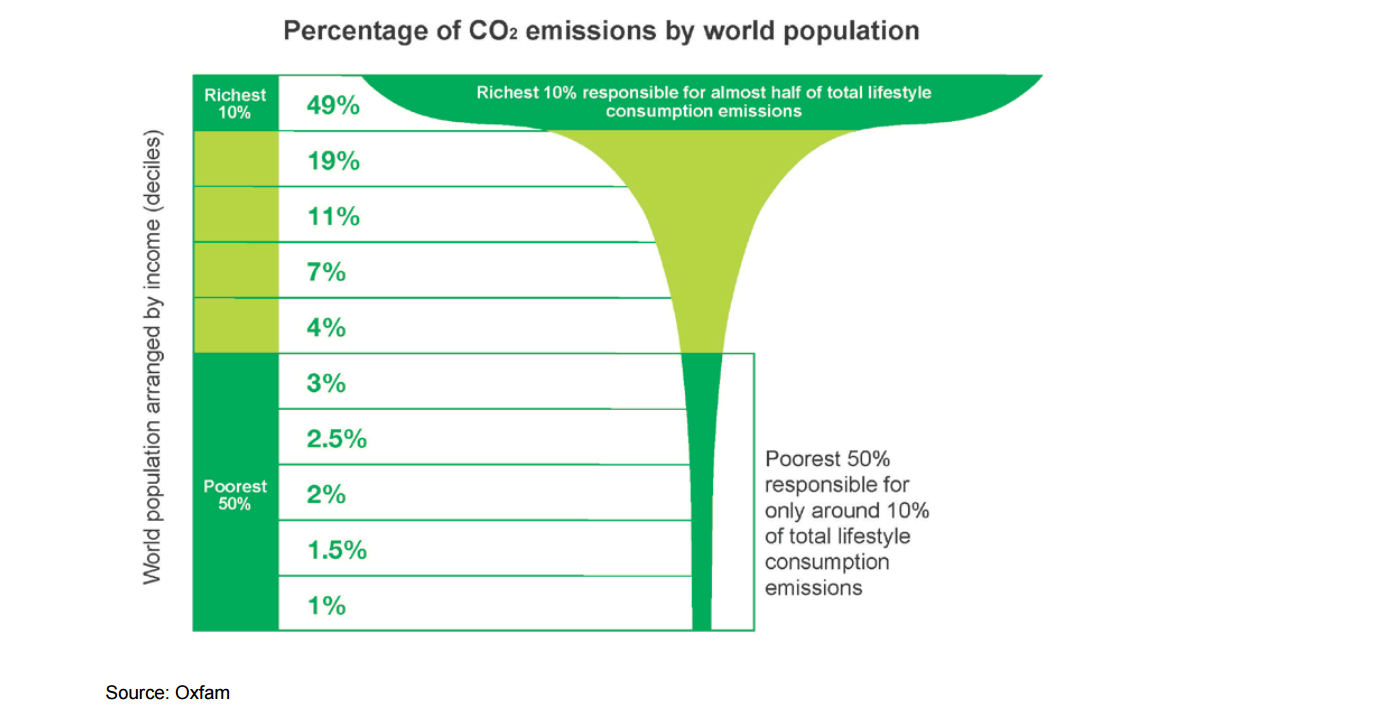World’s richest 10% produce half of carbon emissions, poorest half just a tenth

The world’s richest 10 percent produce around half of all emissions while the poorest half of the world’s population – 3.5 billion people – is responsible for just a tenth of all carbon emissions, despite being the most threatened by the catastrophic storms, droughts, and other severe weather shocks linked to climate change, a new Oxfam report released during the ongoing climate talks in Paris.
Extreme Carbon Inequality provides new estimates of the lifestyle consumption emissions of rich and poor citizens in different countries.
While negotiators might be working to reach an agreement based on the total emissions produced by their respective countries, the charity believes that this analysis helps dispel the myth that citizens in rapidly developing countries are somehow most to blame for climate change.
While emissions are rising fastest in developing countries, much of this is for the production of goods consumed in other countries, meaning that the emissions associated with the lifestyle of the vast majority of their citizens are still far lower than their counterparts in developed countries, the report shows.
As a recent World Bank report showed, the poorest are also the most vulnerable and least prepared to cope with the effects of climate change, regardless of national borders. Droughts, floods, and superstorms have hit countries like both the United States and the Philippines, affecting people in poverty more than the average citizen.
Women, especially those in rural communities, are most at risk, since they often depend on agriculture and have few other opportunities to make a living.
“Climate change and economic inequality are inextricably linked and together pose one of the greatest challenges of the 21st century,” Oxfam’s head of food and climate policy, Tim Gore, said “Paris must be the start of building a more human economy for all – not just for the ‘haves,’ the richest and highest emitters, but also the ‘have-nots,’ the poorest people who are the least responsible for and most vulnerable to climate change.”
Oxfam stressed that the report makes clear the extent of this inequality in emissions responsibility – globally, within and between countries, for example:
- Someone in the richest one percent of the world’s population uses 175 times more carbon on average than someone from the bottom 10 percent.
- Someone in the richest 10 percent of citizens in India uses on average just one quarter of the carbon of someone in the poorest half of the population of the United States.
- The emissions of someone in the poorest half of the Indian population are on average just one-twentieth those of someone in the poorest half of the US population.
- The total emissions of the poorest half of the population of China, around 600 million people, are only one-third of the total emissions of the richest 10 percent in the US, some 30 million people.
“We need to take immediate action to curb emissions and to invest in climate adaptation to close the inequality gap,” Julie Delahanty, Oxfam Canada’s Executive Director, said. “Every country needs to do more, but rich countries like Canada should take bold action and lead the way.”
“Prime Minister Trudeau delivered an inspiring speech as he took to the world stage in Paris to tell all nations that Canada is ready to help the world get closer to a strong climate deal,” she added. “Prime Minister Trudeau, along with other world leaders, need to step up. The human costs of climate change, especially for poor rural women, must be central to the discussions in Paris. Only with further cuts to emissions and more climate funding will vulnerable communities – who are already facing unpredictable floods, droughts and hunger – be able to adapt to survive.”
“The money that the Government of Canada has committed is welcome but it has to be in addition to the existing aid budget since Canada needs to continue to directly address poverty and inequality, including funding for needed public services like health and education,” Delahanty concluded.
According to the report, the only people who benefit from the status quo and who stand to gain from a weak deal in Paris is a select group of billionaires, who have made many of their fortunes in the fossil fuel industry. Tackling the economic inequality that these ‘carbon barons’ thrive on is critical both to ending extreme poverty and fighting climate change.
The report is endorsed by Lucas Chancel and Thomas Piketty, co-authors of Carbon and Inequality from Kyoto to Paris, of the Paris School of Economics, and Mary Robinson, President of the Mary Robinson Foundation – Climate Justice.
Oxfam is also calling for the Paris deal to recognize the need to address loss and damage from the effects of climate change to which it is not possible to adapt, as well as ensure that all climate projects and actions respect human rights and gender equality.



